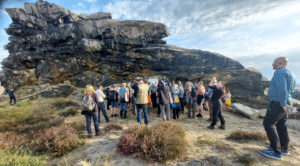Project 2440 sa: Geochronology and prehistoric archaeology of fluvial terraces (GPAFT)
Improving understanding of the techniques involved in the study of, and processes affecting fluvial environments, and the evidence for human activity in those environments
Abstract
There is abundant evidence that people of the Palaeolithic and Mesolithic utilised river systems as a source of resources and as transportation routes through the Scottish landscape. Rapid evolution of river systems in deglaciated landscapes occurred during significant changes in the local paleoenvironment during the Late Glacial/Early Holocene period. Fluvial terraces are complex, multiphase features with elements created at different times and by different processes in different environments. As such, understanding the context of archaeological finds and features within river terraces requires careful interpretation of ages derived from the available dating techniques, such as luminescence and cosmogenic exposure dating, and a contextual understanding of artefact assemblages, and detailed site stratigraphy and landscape analysis, thus this research requires a truly interdisciplinary approach.
This workshop will bring together early career researchers and senior scientists in Quaternary geochronology and geomorphology with archaeologists working on Palaeolithic and Mesolithic occupation of river terraces to improve the understanding of each other’s disciplines, and the role they can play in contributing to integrated studies of early human activity in these environments. This meeting will also foster opportunities for collaboration and build networks for early career and developing country researchers looking to expand their research programs.
The proposed workshop will focus on Deeside in Aberdeenshire, Scotland, where numerous successful archaeology projects have used a holistic approach to understanding the context of active Mesolithic and Palaeolithic communities living along the River Dee.

Objectives:
- foster networks of researchers in complementary disciplines, and across geographic regions;
- an improved understanding of techniques and approaches used in the study fluvial systems across disciplines;
- assessment of collaborative works and potential funding sources;
- engagement between academics and local community groups with overlapping interests.
Project Leaders:
- Sam Kelley, Ireland
- Simon Allerton, UK
- Martin Moucheron, Ireland
Discover more
Latest developments
View moreLatest developments Podcast INQUA India 2027
Podcast INQUA India 2027Quaternary is the age when modern recognisable humans started inhabiting this planet. All over the world scientists are engaged in studying various aspects of human evolution. Once every 4 years scientists from all across the…
 PALCOM-supported sessions
PALCOM-supported sessionsINQUA PALCOM interactive bulletin of scientific sessions for the INQUA Congress 2027
 New QP Issue Out!
New QP Issue Out!QP Issue 39 December 2025 is now available online!
 INQUA 2025 Sir Nicholas Shackleton Medal
INQUA 2025 Sir Nicholas Shackleton MedalThe INQUA 2025 Sir Nicholas Shackleton Medal recipient is Prof. Dr. Nicole Khan from the University of Hong Kong (Hong Kong)
 7th International Palaeontological Congress – IPC7
7th International Palaeontological Congress – IPC7The 7th International Palaeontological Congress (IPC7) will be held between 30 November – 3 December 2026 in Cape Town, South Africa
 4th International Conference Polar Climate and Environmental Change in the Last Millennium
4th International Conference Polar Climate and Environmental Change in the Last MillenniumThe 4th International Conference Polar Climate and Environmental Change in the Last Millennium will be held in Toruń on August 28–30, 2026

